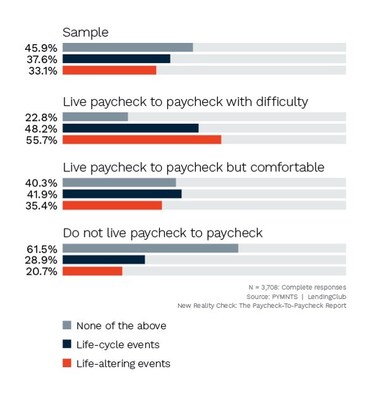65 Percent of Paycheck-to-Paycheck Consumers Experienced a Financially Stressful Event in the Past Three Years
Rhea-AI Summary
LendingClub Corporation (NYSE: LC) released findings from its latest report indicating that 65% of paycheck-to-paycheck consumers faced a financially stressful event in the past three years. High-income individuals earning over $250,000 reported that family expenses contribute significantly to their financial distress. The report highlights the challenges faced by consumers, with many relying on credit to manage expenses. Key life events, including job loss and serious illness, have also intensified these financial struggles. The survey included responses from over 3,700 consumers across the U.S.
Positive
- LendingClub continues to provide valuable insights into consumer financial behavior through its research.
- The report emphasizes the creditworthiness of paycheck-to-paycheck consumers, indicating potential market opportunities.
Negative
- High-income consumers struggle financially due to family-related expenses, indicating possible risks for future lending.
- The report underscores a prevalent financial distress among consumers, which may limit future spending and borrowing.
News Market Reaction
On the day this news was published, LC declined 0.46%, reflecting a mild negative market reaction.
Data tracked by StockTitan Argus on the day of publication.
3 in 10 Earning Over
Nearly
SAN FRANCISCO, June 27, 2022 /PRNewswire/ -- LendingClub Corporation (NYSE: LC), the parent company of LendingClub Bank, America's leading digital marketplace bank, today released findings from the 11th edition of the Reality Check: Paycheck-To-Paycheck research series, conducted in partnership with PYMNTS.com. The Financial Distress Factors Edition examines the financial lifestyle of U.S. consumers who live paycheck to paycheck, the factors that cause financial distress – life-cycle events or life-altering events – and the impact of these financial stressors on their lives.
Key Takeaways:
"Consumers have experienced a tough last couple of years as different factors have affected their financial lifestyle and there seems to be little relief in sight," said Anuj Nayar, LendingClub's Financial Health Officer. "While the specific nature of the event that causes financial distress may vary, it's clear we all need to plan for the unexpected. It's simply a matter of time before something will come up to knock even the best laid financial plans askew."
Living paycheck to paycheck means devoting all of one's salary to expenses with little to nothing left over at the end of the month, yet many of these consumers remain credit-worthy, actively managing their cash flows in real time. Paycheck-to-paycheck consumers fall into two categories: those who can pay their monthly bills easily and those who struggle to do so.
The Impact of Major Life Events on Living Paycheck To Paycheck
To understand the drivers of financial distress, this report surveyed consumers about life-cycle events such as getting married or divorced, birth of a child, moving residences and retirement, and financially life-altering events such as a job loss, serious illness, disability, or major unexpected expenses such as a natural disaster or lawsuit.
According to the data, more than half of U.S. consumers have faced either a life-cycle event or a life-altering event in the last three years. Life-cycle events, such as marriage or having a child, are the most common events, with
While low income is cited as a cause of financial distress, paycheck-to-paycheck consumers from high-income brackets and large households cite paying for a family member's expenses as a driver of financial distress. In fact, nearly
How Paycheck-To-Paycheck Consumers Save
One in five consumers living paycheck to paycheck have spent more than what they have earned in the last six months, with those struggling to pay bills seeing their savings cut in half over the past year. Close to half of all paycheck-to-paycheck consumers say their salary only covers basic expenses and is a reason behind their financial distress. While many consumers leverage credit as a financial tool to manage expenses and cash flow during financially distressing events, high-income consumers tend to use it more.
"Setting an automatic transfer to a savings account, even if it's a small amount, can help you weather the next storm because it's not if you'll need the cash, but when. Credit can also be an effective tool to help with expenses during financially distressing events, but those struggling financially should exercise caution," continued Nayar. "Credit card interest rates are rising, and, if you don't intend to pay your bills in full monthly, you could potentially get into a steep revolving debt trap. For those looking for relief, consider refinancing high-interest debt into a lower cost installment loan."
To view the full report, visit: https://www.pymnts.com/study/reality-check-paycheck-to-paycheck-financial-distress-consumer-savings-credit/
Methodology
New Reality Check: The Paycheck-To-Paycheck Report is based on a census-balanced survey of 3,708 U.S. consumers conducted from May 10 to May 23. The Paycheck-To-Paycheck series expands on existing data published by government agencies such as the Federal Reserve System and the Bureau of Labor Statistics to provide a deep look into the elements that lie at the backbone of the American consumer's financial wellness: income, savings, debt and spending choices. Our sample was balanced to match the U.S. adult population in a set of key demographic variables:
About LendingClub
LendingClub Corporation (NYSE: LC) is the parent company of LendingClub Bank, National Association, Member FDIC. LendingClub Bank is the leading digital marketplace bank in the U.S., where members can access a broad range of financial products and services designed to help them pay less when borrowing and earn more when saving. Based on more than 150 billion cells of data and over
CONTACT:
For Investors: IR@lendingclub.com
Media Contact: Press@lendingclub.com
PYMNTS Contact: information@PYMNTS.com
![]() View original content to download multimedia:https://www.prnewswire.com/news-releases/65-percent-of-paycheck-to-paycheck-consumers-experienced-a-financially-stressful-event-in-the-past-three-years-301575309.html
View original content to download multimedia:https://www.prnewswire.com/news-releases/65-percent-of-paycheck-to-paycheck-consumers-experienced-a-financially-stressful-event-in-the-past-three-years-301575309.html
SOURCE LendingClub Corporation









